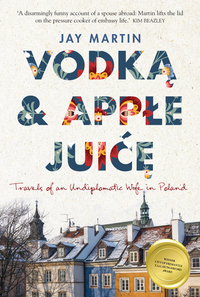Take a photo of a barcode or cover
As a person who moved to Warsaw myself for a small snippet of my life, this book struck a chord with me. I think it is well written and relatable. It brings back many memories of my own time there. While others may not experience this title in the same way, I think there is much to be enjoyed and it is worth the read.
It's probably half a star more than the writing deserves but I enjoyed this for the glimpse into Poland and the reality of life as a diplomatic spouse.
lighthearted
reflective
medium-paced
Intriguing look at the diplomatic life from a position note quite in the trenches: When Martin's husband decided to switch tacks and become a diplomat, she went along for the ride—to Poland, as it turned out. But because diplomacy is no longer (officially) a job requiring both the diplomat and his (or her, but usually his) spouse, and in a pre-plague world remote work wasn't on the table, this also meant Martin setting her work life aside. And that meant figuring out what to do with herself in Poland.
I admit: I was put on guard early on. It was this:
But Martin surprised me, both by putting in extensive effort to learn and explore and by her willingness to reevaluate her own preconceptions. It must be a strange life, diplomacy. Stranger for trailing spouses. Take this:
I admit: I was put on guard early on. It was this:
It was the first experience of apartment living for either Tom or I—but with two bedrooms, a single open-plan dining room and kitchen, and small separate study, I thought we could make it work.
‘It’s lovely, although a bit small—just one hundred square metres,’ I said.
Svetlana and Jutta burst out laughing. ‘My apartment is forty square metres,’ Jutta said.
‘Mine’s thirty-five,’ Svetlana said.
What did a thirty-five square metre apartment even look like? (15)My own flat is, incidentally, forty square metres, and frankly, I struggled to imagine how someone who was dismayed by the thought of having 'only' two and a half times this space would manage to come back to a more relatable place. (Not that it's a bad thing to have more space, obviously; I just wonder how you can relate to the average resident if even living in an apartment rather than a house feels like a brave step into the unknown.)
But Martin surprised me, both by putting in extensive effort to learn and explore and by her willingness to reevaluate her own preconceptions. It must be a strange life, diplomacy. Stranger for trailing spouses. Take this:
Tom had written to Canberra to request extra resources. Canberra refused, citing Tom’s non-working spouse, and so now I was part of the [unpaid] team. (61)At no point was Martin a paid part of the diplomatic corp (note that some, but not all, countries pay diplomatic spouses, but I can't work out whether or not Australia does and in any case the payment typically amounts to a paltry stipend), but she was expected to, you know, play the supportive wife as needed. Run errands. Speak Polish as required, once her Polish—which she learned on her own time and at her own cost—was up to the task. Smile and look interested and not be offended when she was written off as wife:
I didn’t have to come to any of these events. Most spouses didn’t, and I could understand why. I was used to briefing ministers and heads of government departments on media strategies or complex social issues. But I’d had no training in making chitchat with them over canapés—or how to respond to the bored look they’d give me when I revealed I was just a wife. Spouses were invited to the events, but not into the conversations. (43)And perhaps I was off base to think that a diplomat should be able to relate to the locals they're living with, because certainly many of the diplomats—and diplomats' spouses—Martin got to know could not. It was not, for many of them, their job: not their job to learn Polish, not their job to travel beyond Warsaw and Kraków, not their job to make an effort to get outside the gilded zone. Rather, it was their job to rub elbows with other diplomats, to make connections, to go to dinner parties and art openings. To set the groundwork for favours being asked and answered. Sometimes that life sounds terribly sad to me:
‘And where is that painting from?’ Harry pointed to one bayside beach scene that took up almost a whole wall.
‘Oh, it’s all from Artbank,’ the Ambassador said. The name of the service senior public officials could avail themselves of to decorate their offices and homes elicited another laughing nod between Harry and the Ambassador. (132)Not that everyone has to be deeply invested in décor (certainly I am not), but golly, I think I'd feel like I was living in a hotel if I was just borrowing art from a central collection—arbitrary art with no story. And yet, at times, we see the people who seem to get it:
Alex put a canapé in his mouth and chewed. ‘You know that last ambassador [of the US], the one with the baby elephants [on his tie]?’ he said, ‘He also had a map of Poland on the wall of his office. And he put a pin in every place he went to. And by the end of it, you almost couldn’t see anything of the map for all the pins. And the “serious” people at the embassy would grumble about what a waste of time and money it was when they were off doing “real” diplomatic work. But over the years, they realised that people in the remotest corners of Poland were positively disposed towards America, because an ambassador had bothered to go there and shake their hands, and no one had ever done that before.’ (262)Martin managed to cover an impressive span of the country (and a few others besides—although I must note that while I cannot speak for her Polish, the little German included in the book when she travels to Germany is appalling; as an example, she uses a zo as an interjection multiple times, and I can only assume that ach so is intended) and pick up all sorts of information in her time in Poland. Far and away my favourite story is that of the Eighth Polish (and Sixth International) Hand Scything of Boggy Meadows for Nature Championship. Yes, really. It says something that this exists, but it also says something about those who choose to attend as spectators.
‘I suppose I can tell you something now,’ Julie said, looking at me.
So this is the part where she confessed she hadn’t really wanted to come, I thought.
‘I thought we would be doing the scything.’
‘You thought we’d be doing the scything? And you came anyway?’ I was pretty sure then that our potential friendship was more than just a case of common geographic origins. ‘So that’s why you brought the gumboots?’ (164)Truly, how great is that?
As a Pole, it's always interesting to read about Poland through the eyes of a Westerner. I greatly enjoyed reading the author's reflections on being a diplomat and the Polish psyche; however, I found the portion of the book dealing with her relationship with her husband to be the weakest by far. The marital discord portions of the book were not interwoven into the whole particularly well, and I felt that storyline would have been better served by a separate book.
Very interesting account of an accompanying spouse's posting to Poland.
Jay Martin and her husband Tom give up their comfortable public servant life in Canberra to pack up and move to Warsaw for three years, so Tom can live out his dream of being an Australian diplomat. The hours are long for him, the experience isolating for them both and it puts a strain on their marriage.
However, Jay is the ideal expat. She’s gone from working full-time in a senior role to becoming a ‘diplomat’s wife’. Rather than lamenting her lack of work, she sees the opportunity of this time abroad as a career break and instead throws herself headfirst into her new life – learning the extraordinarily difficult Polish language, making Polish friends, travelling around to spots not often visited by tourists and eventually writing about this new country that becomes her temporary home.
It’s not all sunshine and puppy dogs tails (what life is?) but her ability to pull herself out of the ruts she finds herself in is commendable (although sometimes she assisted with the help of well meaning, yet frank close friends).
Told with good humour, this is a really interesting insight into both the expat experience, the life of a diplomat and Polish culture as a whole.
Read more here https://www.birdgehls.com/australian-books-2018/
However, Jay is the ideal expat. She’s gone from working full-time in a senior role to becoming a ‘diplomat’s wife’. Rather than lamenting her lack of work, she sees the opportunity of this time abroad as a career break and instead throws herself headfirst into her new life – learning the extraordinarily difficult Polish language, making Polish friends, travelling around to spots not often visited by tourists and eventually writing about this new country that becomes her temporary home.
It’s not all sunshine and puppy dogs tails (what life is?) but her ability to pull herself out of the ruts she finds herself in is commendable (although sometimes she assisted with the help of well meaning, yet frank close friends).
Told with good humour, this is a really interesting insight into both the expat experience, the life of a diplomat and Polish culture as a whole.
Read more here https://www.birdgehls.com/australian-books-2018/
3.5 stars
I enjoyed this travel memoir from Australian Jay Martin documenting her three year stay in Poland. Her husband Tom, who was Australian’s diplomat in Warsaw was supremely busy why Martin struggled with her years “not working”, traveling, learning Polish, and keeping their marriage together. Martin has a good sense of humor and this was a quick read. Recommended for travel and language lovers; Polish and Australians and diplomats.
Pub date Sept 1.
I enjoyed this travel memoir from Australian Jay Martin documenting her three year stay in Poland. Her husband Tom, who was Australian’s diplomat in Warsaw was supremely busy why Martin struggled with her years “not working”, traveling, learning Polish, and keeping their marriage together. Martin has a good sense of humor and this was a quick read. Recommended for travel and language lovers; Polish and Australians and diplomats.
Pub date Sept 1.


